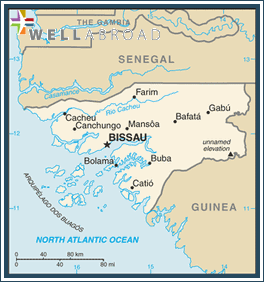|
MOST RECENT ALERTS
There's no recent alert.
|

|
|||||||||||||||
| COUNTRY OVERVIEW | ||||||||||||||||
|---|---|---|---|---|---|---|---|---|---|---|---|---|---|---|---|---|
|
| COUNTRY GENERAL INFORMATION | |||||||
|---|---|---|---|---|---|---|---|
| Language: |
Portuguese (official), Crioulo, African Languages |
||||||
| Currency: | Communaute Financiere Africaine franc (XOF); note - responsible authority is the Central Bank of the West African States | ||||||
| Predominant Religions: |
indigenous beliefs 50%, Muslim 45%, Christian 5% |
||||||
| National Holidays: | Independance Day,24 September (1973) | ||||||
| Economic Status: |
The country underwent a civil war in 1998-99 that devastated the economy. One of the 10 poorest countries in the world, Guinea-Bissau depends mainly on farming and fishing. The inequality of income distribution is one of the most extreme in the world. |
||||||
| Security: |
People's Revolutionary Armed Force (FARP): Army, Navy, AirForce,paramilitary force |
||||||
| US Presence: |
U.S. Virtual Consulate in Guinea-Bissau
Route des Almadies – BP 49 Dakar, Senegal Telephone: (221) 33-879-0000 |
||||||
| Document Requirements: |
A valid passport, visa, and proof of onward/return ticket are required. Since January 2007, the Bissau-Guinean Embassy in Washington, DC, has been temporarily closed. The Embassy of Guinea-Bissau does not have a website. Due to lack of consular representation in the U.S., it is difficult to obtain the required visa for entry into Guinea-Bissau. Since most flights destined for Guinea-Bissau must pass through Dakar, Senegal, or Lisbon, Portugal, most travelers are able to apply for visas at the Bissau-Guinean embassies in those countries. Although it is possible to obtain a visa upon arrival in Bissau if arrangements are made in advance, there are no clear instructions for how to make those arrangements. The U.S. Department of State is unaware of any HIV/AIDS entry restrictions for visitors to or foreign residents of Guinea-Bissau. Information about dual nationality or the prevention of international child abduction can be found on our website. For further information about customs regulations, please read our Customs Information page. |
||||||
| Major Airports: |
Airports: 28, Airports w/paved runways: 3 |
||||||
| Servicing Airlines: |
|
||||||
| Risks and Precautions: |
Although the civil war that led to the closure of the US Embassy ended in 1999 and elections were held in June and July 2005, travelers should be aware that political tensions persist. Sporadic politically motivated violence has taken place in the past two years. Due to the potential for violence, US citizens should avoid political gatherings and street demonstrations, and maintain security awareness at all times. |
||||||
| Mortality Statistics: |
Infant MR total: 103.5 deaths/1,000 live births Life expectancy at birth: TOTAL 47.18 years |
||||||
| Immunization Indicators: |
Required: Yellow Fever Recommended:Malaria, Hep A & B Meningococcal, Rabies,Typhoid, Boosters: MMR, DPT,polio |
||||||
| Infectious Disease Concerns: |
degree of risk: very high |
||||||
| Overall Quality of Medical Services: |
While modern medical facilities are virtually nonexistent in Guinea-Bissau and travelers should not rely on them, emergency medical care may be possible at a new hospital in Bissau operated by the Sant’Egidio Community. Monday to Saturday there are flights from Bissau to Dakar, Senegal, where more acceptable levels of medical care are available. |
||||||
| Providers in Network: |
|
||||||
| Recent Medical Threats/ Concerns/Warnings: |
Dengue, filariasis, leishmaniasis, and onchocerciasis (river blindness) are other diseases carried by insects that also occur in this region. Endemic foci of river blindness exist. The risk for contracting African sleeping sickness (trypanosomiasis), which is caused by the bite of an infected tsetse fly, is high in all countries except The Gambia, Niger, and Mauritania. A number of rickettsial infections also occur in this region. Plague occurs sporadically or in outbreaks. Schistosomiasis can be contracted in fresh water in this region. Other infections that tend to occur more often in longer-term travelers (or immigrants from the region) include tuberculosis, HIV and hepatitis B. |
||||||
| Communications Info: |
Country Calling Code: +245 |
||||||






